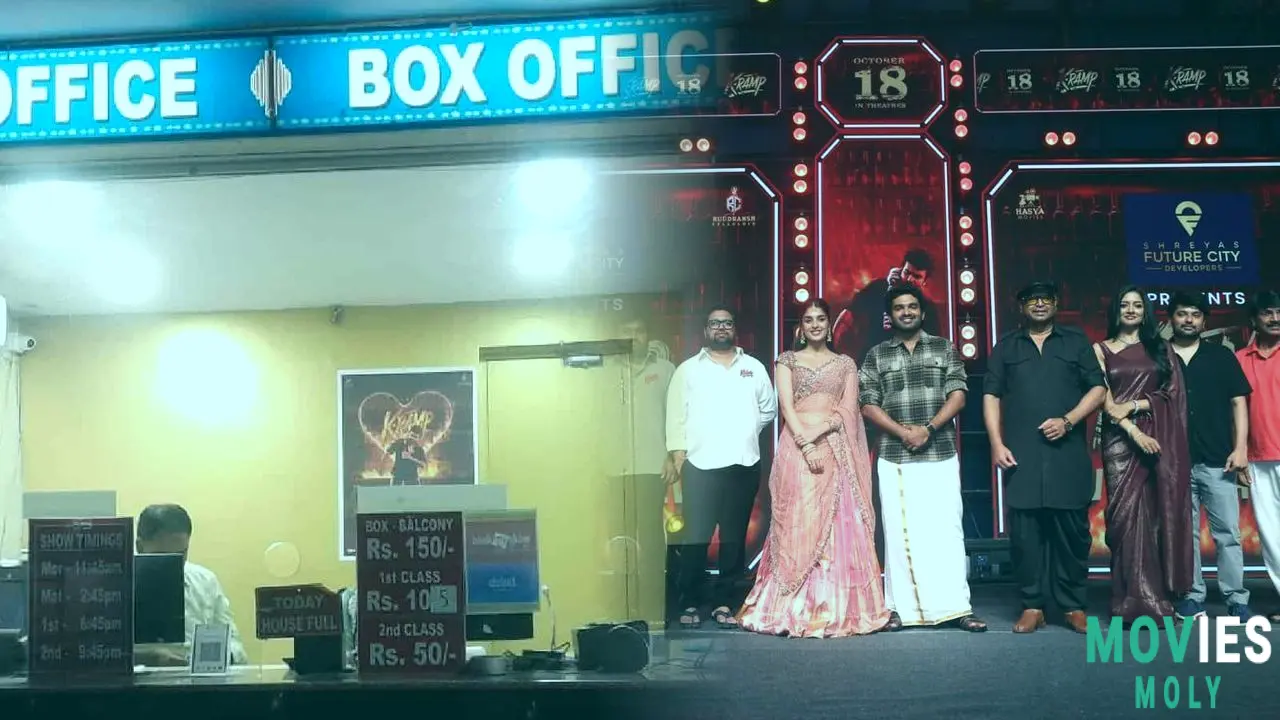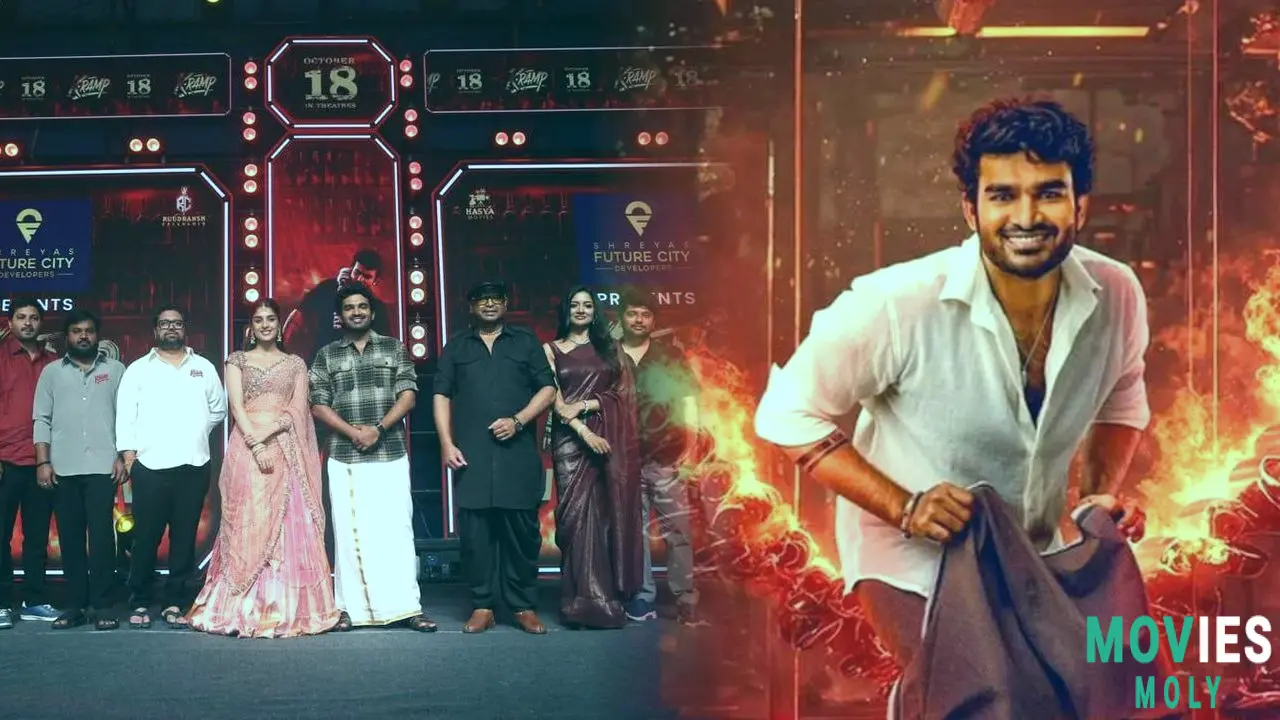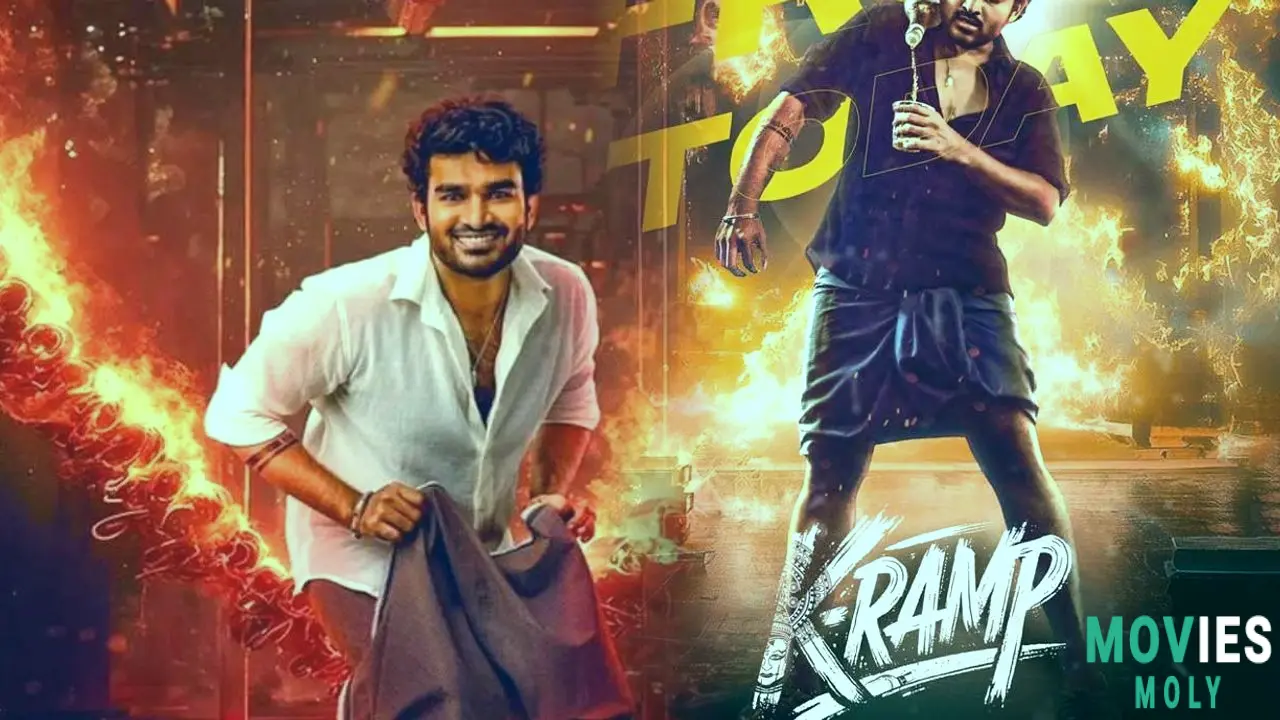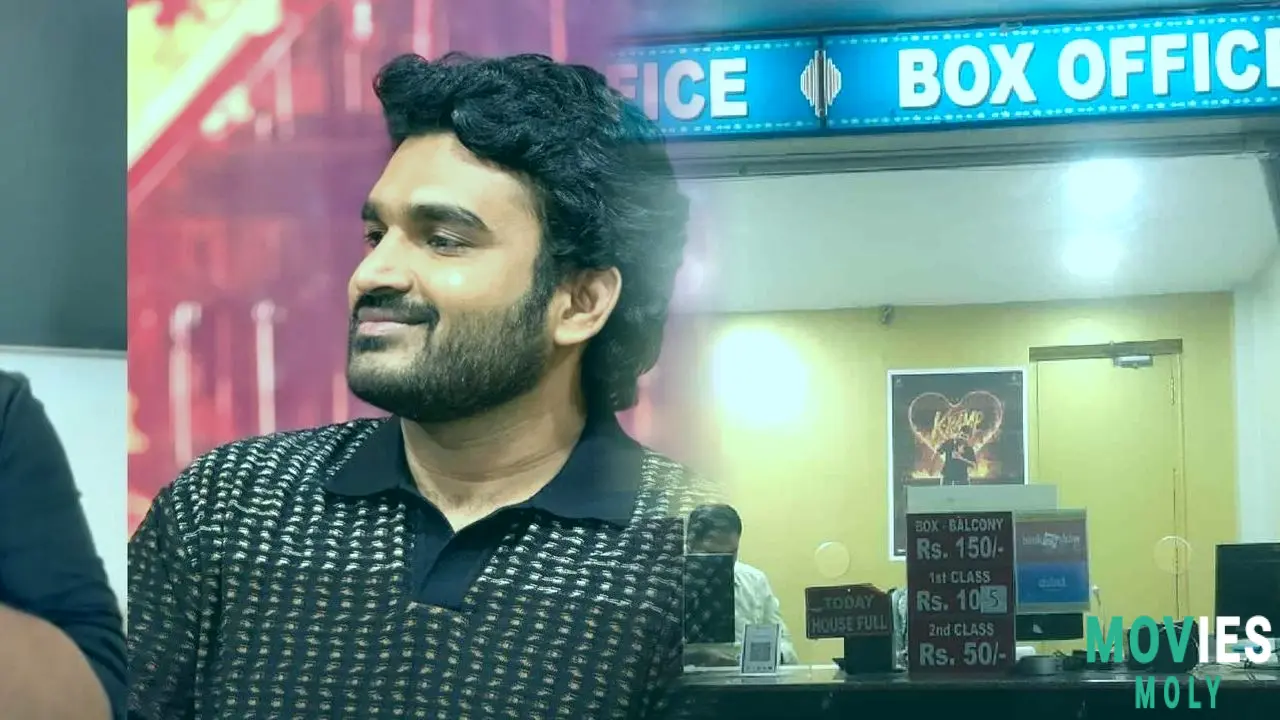Kiran Abbavaram's latest, K-ramp, hit theaters this Diwali, sparking a fascinating divide between critics and fans but ultimately winning hearts and making a splash in B and C centers with its energetic blend of comedy and emotion.
TL;DR: Your Quick K-Ramp Rundown
- Kiran Abbavaram and Yukti Thareja's commercial entertainer, K-Ramp, released on October 18, 2025, just in time for Diwali.
- While professional critics offered mixed-to-low ratings, audiences, especially in smaller towns, have embraced the film, calling it a "Diwali winner."
- The movie's box office performance in rural and mass centers has been surprisingly strong, showcasing Kiran Abbavaram's growing popularity with those crowds.
Diwali movie releases always bring a special kind of excitement, and this year, Kiran Abbavaram's K-Ramp certainly added to the festive fireworks! Directed by debutant Jains Nani, this film arrived with a promise of commercial entertainment. But here's the kicker: its journey so far has been a tale of two different stories. On one side, we've got the critics, giving it a lukewarm reception. On the other? The audiences, who seem to be having an absolute blast, turning the film into a surprise box office performer in many areas. Let's dive into what makes K-Ramp such a conversation starter!
Unpacking the Intriguing Premise of K-Ramp: A Story Beyond the LaughterAt its core, K-Ramp introduces us to Kumar (played by Kiran Abbavaram), a rich, carefree youngster who isn't exactly acing his academics. His millionaire father, Krishna (Sai Kumar), decides some discipline is in order and sends him off to an engineering college in the picturesque setting of Kerala. It's there that Kumar crosses paths with the charming Mersi Joy (Yukti Thareja), and, as movie magic dictates, he falls for her pretty quickly. Mersi eventually reciprocates his feelings, and things seem to be heading for a classic romance.
However, the film throws a compelling twist into this love story: Kumar discovers Mersi suffers from Post-Traumatic Stress Disorder (PTSD), specifically an inability to tolerate lies. This condition leads to extreme, unpredictable reactions, like when she attempts suicide after Kumar fails to meet her on time. This severe quirk becomes the central driving force for much of the film's narrative and, surprisingly, a source of comedy in the second half. The story then unfolds around Kumar's journey to understand and manage Mersi's condition while fighting for their love, aiming to blend a serious psychological issue with commercial entertainment elements.
Kiran Abbavaram's Power-Packed Performance and Yukti Thareja's Pivotal Role

One thing almost everyone agrees on is Kiran Abbavaram's performance. Reviewers and fans alike have called him a "livewire" in K-Ramp, noting his "high energy levels, effortless body language, and amusing expressions" that inject a palpable liveliness into the film. Even those who found the plot lacking praised his noticeable improvement in acting, calling his portrayal "fresher and more impactful." He really leans into the role of a wealthy student with a penchant for drinking, perfectly balancing his mass appeal with a youthful, relatable vibe.
Kiran truly shines in the film's second half, especially as his character navigates the complexities of Mersi's condition, sometimes humorously referring to her extreme reactions as turning her into a "mini Chandramukhi."
But Kiran isn't the only one carrying the show. Yukti Thareja, as Mersi Joy, isn't just a glamorous face. Her character is central to the entire story, a departure from many commercial films where the heroine's role is often secondary. Yukti not only looks stunning but also makes a "solid impression with her performance," convincingly portraying a character with a rare disorder. The chemistry between Kiran and Yukti has also been highlighted as a definite "plus point," adding a sweet touch to their unconventional love story.
The Great Divide: Why Critics and Audiences Saw K-Ramp So Differently

This is where things get interesting! K-Ramp has truly become a film that divides opinion, with a stark contrast between critical reception and audience adoration. Let's break down why:
What Didn't Click with the Critics?
Most film critics, including 123telugu.com (2.75/5), Telugu360 (2/5), Cinejosh (2/5), and GreatAndhra.com (2.5/5), generally gave K-Ramp lower ratings. Their main points of contention included:
- A Dull First Half: Many found the initial portions "uneven," "formulaic," and "routine," with a generic love track and a lack of standout moments. The Kerala setting, despite promises of beautiful visuals, didn't always add much "authenticity" to the story.
- Loud and Crass Humor: Critics pointed out that while the film aimed for comedy, some jokes felt "loud and outdated," drifting into "double-meaning territory," and even "outright cringe." One review even mentioned Kiran Abbavaram's character calling a flashback "cringe," indicating a self-awareness that didn't prevent the filmmakers from including such elements.
- Lack of Emotional Depth: Despite the serious undertones of Mersi's PTSD, the film was criticized for lacking "emotional depth." The romance sometimes felt "superficial," and the sentiment, particularly the father-son angle, didn't always "land" effectively.
- Technical Gripes: The music, especially the songs by Chaitan Bharadwaj, was often described as "weak" and failing "to register." Editing by Chota K Prasad was also noted as needing improvement, with proceedings feeling "slow at times."
- Questionable Supporting Roles: Senior actor Naresh's role, while praised by fans, was seen by some critics as "cheap" and "out of sync for his age."
Why Audiences Are Showering It with Love!
Despite the critical jabs, the audience response, particularly on social media and at the box office, has been overwhelmingly positive. Fans celebrated K-Ramp as a "Diwali winner" and praised it for:
- The Shocking Interval Twist: Many viewers were "stunned" by the unexpected twist at the interval, which critics also acknowledged as the point where the film finally gained momentum.
- Second Half Entertainment: There's a consensus that the latter half of the film delivers more laughs and engagement, with comedy sequences specifically built around Mersi's disorder really hitting home.
- Strong Family Emotions: The film's emotional core, particularly the father-son bond between Kiran Abbavaram and Sai Kumar (and scenes involving Naresh), deeply "touched the hearts of the fans." Many called it "heartwarming entertainment suitable for watching with the family."
- Healthy, Engaging Comedy: Fans appreciated the "healthy entertainment" woven through college and exam scenes, alongside the overall blend of comedy, romance, and family sentiments.
"Thank you so much for the positive response, Pandaga Cinema #KRamp. We made this movie to entertain you, and we are so happy it is doing that. Thank you for supporting me."
— Kiran Abbavaram (Actor, via social media)
How K-Ramp is Conquering the Box Office in Mass Centers

Here's the real testament to its audience connection: despite those mixed critical reviews, K-Ramp has emerged as a "surprise performer at the box office." Reports indicate a significant pickup in Andhra Pradesh, especially in B and C centers (which typically cater to mass audiences and smaller towns). Night shows have seen "strong occupancy," and some theaters even put up "House Full" boards, with extra shows being added due to high demand.
The credit for this success largely goes to Kiran Abbavaram's "growing popularity among the rural and small-town crowd." His energetic screen presence and the film's "catchy, mass-friendly title" have clearly struck a chord. While multiplex audiences might not be showing as much interest, the film's "local flavor and commercial elements" are resonating strongly with mass moviegoers, proving that sometimes, audience sentiment can outweigh critical opinion.
The Visionaries Behind the Scenes: Producers Rajesh Danda and Shiva Bommakku Share Insights
K-Ramp was a joint venture by leading production houses Hasya Movies and Rudransh Celluloid, helmed by producers Rajesh Danda and Shiva Bommakku. In pre-release interviews, they shared some fascinating insights:
- The Name Game: Producer Rajesh Danda revealed he always wanted to work with Kiran Abbavaram. The title "K-Ramp" was a shortened version of "Kumar Ramp," inspired by the hero's character name and Kiran's past films which often started with 'K'.
- Fast-Track Production: This was the fastest-completed film from their banner, wrapped up within six months. This efficiency was attributed to the director and hero being well-prepared and trimming unnecessary scenes at the scripting stage.
- Kerala's Charm: The story's Kerala backdrop was intentionally chosen to add a "fresh look to the visuals," promising a "visual treat" with beautiful college sequences and an Onam song. Cinematographer Sateesh Reddy Masam was praised for capturing these scenic locations.
- Family First: Despite receiving an 'A' certificate, producers clarified it wasn't due to vulgarity but rather the "realistic tone" of the characters. They consciously avoided "spicier dialogues" to ensure it remained "perfectly family-friendly," aligning with their banner's history of connecting with family audiences.
- Musical Magic & Strong Cast: Chaitan Bharadwaj's music was lauded, with producers confident his "BGM will blast theatres." The "Kalale Kalale" song was particularly highlighted. They also ensured strong supporting performances, noting that Naresh and Vennela Kishore would "entertain audiences," and bringing in talents like Kamna Jethmalani and Vimala Raman for key roles.
- Director's Debut: Debutant director Jains Nani "did an okay job," trying to balance the first-half issues with an entertaining second half, and addressing an "important psychological problem in a commercial manner."
Co-producer Shiva Bommakku echoed these sentiments, expressing his happiness with the film's Diwali release and praising director Nani's "mature" handling of an "extremely entertaining" story.
Diwali Showdown: K-Ramp Braves the Competition
Releasing on a bustling Diwali weekend, K-Ramp wasn't alone. It faced "tough box office competition" from other significant releases like Telusu Kada, and the Telugu-dubbed Tamil films Dude and Bison, which even released a day earlier. However, the producers maintained a spirit of "healthy competition," expressing wishes for all films to succeed and emphasizing the camaraderie among them.
Kiran Abbavaram himself expressed immense confidence before the release, stating, "K-Ramp is a complete entertainer filled with fun, energy, and emotion. We are confident people will celebrate Diwali in theatres with our film. A movie that brings smiles never fails." He also mentioned a sentimental reason for shifting the release from October 17th to the 18th. And looking at the audience turnout in mass centers, it seems his confidence was well-placed!
Frequently Asked Questions About Kiran Abbavaram's K-Ramp When did K-Ramp officially release in theaters? K-Ramp premiered in theaters on October 18, 2025, coinciding with the Diwali festival. Who are the main actors featured in K-Ramp? The film stars Kiran Abbavaram as Kumar and Yukti Thareja as Mersi Joy in the lead roles. Supporting cast includes Sai Kumar, Naresh, Vennela Kishore, Muralidhar Goud, Kamna Jethmalani, and Vimala Raman. Where can I watch K-Ramp on OTT? The OTT rights for K-Ramp have been acquired by Aha Prime Video, so you can expect to stream it there soon. What was the general critical and audience reception for K-Ramp? Critics generally gave K-Ramp mixed to lower ratings (ranging from 2/5 to 2.75/5), often citing a routine first half and some outdated humor. However, mass audiences and fans have responded very positively, praising its entertainment value, emotional second half, and Kiran Abbavaram's performance, leading to strong box office collections in B and C centers. Sources- Information synthesized from various movie review and news outlets including 123telugu.com, TOI Entertainment Desk, Telugu360, GreatAndhra.com, Cinejosh, and IndustryHit.com.






